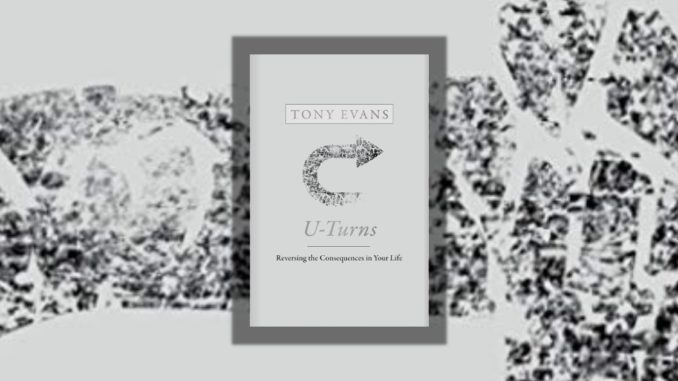
Also by this author: Kingdom Stewardship, Kingdom Encounters: Experiencing More of God When Life Hurts, Hope for the Hurting, Kingdom Race Theology: God's Answer to Our Racial Crisis
Published by B&H Publishing on January 12, 2021
Genres: Non-Fiction, Christian Life
Buy on Amazon
Goodreads

Bestselling author and renowned preacher Tony Evans concludes his series of books about God’s direction over our lives. In U-Turns, Dr. Evans shows readers the reality of human freedom, the consequences that come from negative choices, and the way to reverse those consequences. By aligning your life choices under God’s Word and pursuing an intimate relationship with Him, you can experience the abundant life Jesus has for you. You get to choose whether or not you want that. If you do, you will see how God can reverse the negative consequences of decisions you’ve made.
Tony Evans has made a name for myself with his preaching, teaching, and writing. He’s been doing it long enough now that when you open a book by him, you pretty much know what you’re going to get. U-Turns is no exception, combining folksy pastor jokes and anecdotes with encouragement and inspiration. This book is all about reversing—recognizing your sin and repenting of it.
The first couple of chapters set that tone, with Evans drawing an interesting contrast between Judas and Peter. Both sinned against Jesus. Both felt deep sadness for their sin. One gave in to worldly sorrow. The other submitted to Godly sorrow and repented. It’s a poignant notion that makes the point that being aware or even being sorry for our sin isn’t enough. We have to be willing to do something about it. I will note that the contrast is perhaps a bit artificial. We’re never told that Judas didn’t repent. I’m not saying it’s likely, but there is enough vagueness for caution here.
The chapters that come after detail how to reverse various types of consequences. All of these seem pretty standard—idolatry, addiction, anxiety, emotional, financial, sexual—but there is a subset of consequences that Evans speaks about that stand out for both good and bad reasons. Evans includes chapters on demonic consequences, generational consequences, and discrimination consequences. Given that the rest of the book is about reversing out of one’s own personal sin, including these three chapters without setting them apart from the rest of the book seems like a structural oversight. Individuals dealing with these consequences are more likely to be dealing with consequences they did not bring on themselves. By putting them in the same section as these other things, Evans incorrectly and implicitly seems to make the individual responsible for them. This isn’t his intent—he writes in the chapter on discrimination that the book is about reversing the consequences of negative behavior “either done by you or to you”—but that’s not how the initial structure the book was set up. Simply moving these chapters to the end and setting them on their own section would have helped this book tremendously.
It’s also worth noting that Evans’ view on demonic influence is fairly conservative and fundamentalistic, even for most mainstream evangelicalism. The chapter can’t decide how deeply to dive into this, moving back and forth between demons-behind-every-tree and demons-as-metaphor. The reality, in my opinion, is much more nuanced and Evans really isn’t equipped to handle that as its own specific chapter.
The rest of the book is…fine. It’s pretty simple, straightforward, conservative Baptist stuff. It reads like a sermon series formatted into a book, which is likely was. It’s a lot of rah-rah encouragement, but not very deep. And I just kept thinking that I wanted more. This book might provide the kick in the pants needed to start a U-Turns, but it doesn’t offer much in the way of practical advice on how to turn around when you don’t even feel like you’re the one driving. It offers a fairly simplistic, superficial view of repentance that doesn’t do justice to the hard, Spirit-led work that repentance actually is. This a book is a beginning but it’s milk, not meat.
